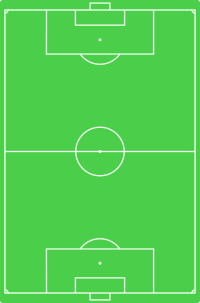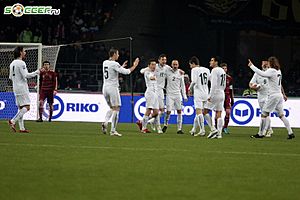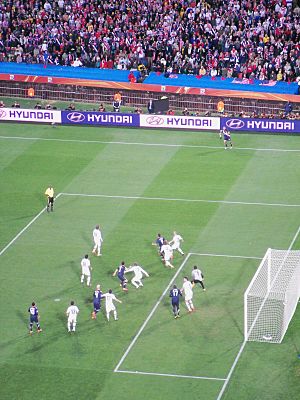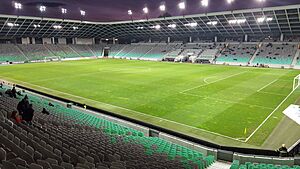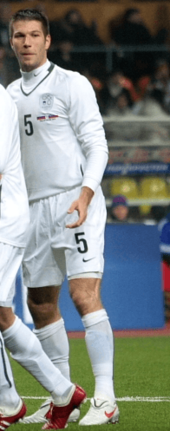Slovenia national football team facts for kids
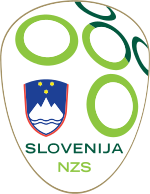 |
|||
| Association | Football Association of Slovenia (NZS) | ||
|---|---|---|---|
| Confederation | UEFA (Europe) | ||
| Head coach | Matjaž Kek | ||
| Captain | Jan Oblak | ||
| Most caps | Boštjan Cesar (101) | ||
| Top scorer | Zlatko Zahovič (35) | ||
| Home stadium | Stožice Stadium | ||
| FIFA code | SVN | ||
|
|||
| FIFA ranking | |||
| Current | 63 |
||
| Highest | 15 (October–November 2010) | ||
| Lowest | 134 (December 1993) | ||
| First international | |||
| Unofficial (Ljubljana, Kingdom of SCS; 23 June 1921) Official (Tallinn, Estonia; 3 June 1992) |
|||
| Biggest win | |||
(Muscat, Oman; 8 February 1999) |
|||
| Biggest defeat | |||
(Saint-Denis, France; 12 October 2002) |
|||
| World Cup | |||
| Appearances | 2 (first in 2002) | ||
| Best result | Group stage (2002, 2010) | ||
| European Championship | |||
| Appearances | 2 (first in 2000) | ||
| Best result | Round of 16 (2024) | ||
| Website | nzs.si | ||
The Slovenia national football team (Slovene: Slovenska nogometna reprezentanca) represents Slovenia in international football matches. It is managed by the Football Association of Slovenia. This team plays against other countries in major tournaments like the FIFA World Cup and the UEFA European Championship.
Slovenia played its first official game in 1992. This was one year after the country became independent from Yugoslavia. Most of their home games are played at Stožice Stadium in Ljubljana.
The team has qualified for a major tournament four times. They played in the FIFA World Cup twice and the UEFA European Championship twice. In their first three tournaments, they did not get past the group stage. However, at UEFA Euro 2024, they made it to the knockout rounds. They did this by drawing all three of their group matches.
At the 2010 FIFA World Cup, Slovenia won their first game in a major tournament. They beat Algeria 1–0. Another great result was a 1–0 win against Italy in 2004. This was Italy's only loss during their entire 2006 World Cup journey.
Boštjan Cesar has played the most games for Slovenia, with 101 appearances. Zlatko Zahovič is the top goal scorer, having scored 35 goals for the team.
Contents
- History of Slovenian Football
- Team Identity
- Team Management
- Players and Records
- Tournament History
- Awards and Honours
- See also
History of Slovenian Football
Early Years Before Independence (1921–1991)
Before Slovenia became an independent country in 1991, its football team was not officially recognized by FIFA. On June 23, 1921, Ljubljana hosted a match between France and a team of Slovenian players. Even though it wasn't an official international game, many in Slovenia saw it as the first match for their national team. France won that game 5–0.
Becoming Independent and First Wins (1992–1998)
In 1992, the Football Association of Slovenia joined FIFA. On June 3 of that year, Slovenia played its first official FIFA-recognized match. It was a friendly game against Estonia in Tallinn. The game ended in a 1–1 draw. Igor Benedejčič scored Slovenia's first official goal.
On April 7, 1993, Slovenia got its first international victory. They beat Estonia 2–0 in another friendly match. In 1994, Slovenia started playing in official competitions. They took part in the UEFA Euro 1996 qualifiers. They finished fifth in their group.
The Golden Generation (1998–2002)
UEFA Euro 2000 Journey
In July 1998, Srečko Katanec became the new manager. Under his leadership, Slovenia finished second in their Euro 2000 qualifying group. Zlatko Zahovič scored eight goals during these qualifiers.
In the play-offs, Slovenia played against Ukraine. Slovenia won the first game in Ljubljana 2–1. Milenko Ačimovič scored a fantastic goal from the halfway line. The second game in Kyiv ended in a 1–1 draw. This meant Slovenia won 3–2 overall and qualified for their first major tournament!
At Euro 2000, Slovenia was in a group with Spain, FR Yugoslavia, and Norway. In their first game against Yugoslavia, Slovenia took a 3–0 lead. However, Yugoslavia scored three goals quickly, and the game ended in a 3–3 draw. Slovenia lost to Spain 2–1. Their last game against Norway was a 0–0 draw. Slovenia was eliminated from the tournament.
2002 FIFA World Cup Journey
For the 2002 World Cup qualifiers, Slovenia was in a group with Russia, FR Yugoslavia, and others. Slovenia finished second in their group without losing a single match. They then faced Romania in a play-off. Slovenia won the first game 2–1. The second game was a 1–1 draw. This meant Slovenia won 3–2 on total goals and qualified for their first ever World Cup!
At the World Cup, Slovenia was in a group with Spain, Paraguay, and South Africa. They lost all three matches. In their first game against Spain, Sebastjan Cimirotič scored Slovenia's first World Cup goal. This tournament also saw a disagreement between manager Katanec and star player Zahovič.
A Period of Change (2003–2007)
After Katanec left, Bojan Prašnikar became manager again. Many important players retired from the national team. In the Euro 2004 qualifiers, Slovenia finished second in their group. They then played against their rivals, Croatia, in the play-offs. The first game was a 1–1 draw. Croatia won the second game 1–0, so Slovenia did not qualify.
In 2004, Branko Oblak took over as manager. Slovenia played in the 2006 World Cup qualifiers. They beat Italy 1–0, which was Italy's only loss in their entire World Cup campaign that year. However, Slovenia finished fourth in their group and did not qualify. In January 2007, Matjaž Kek became the new manager.
2010 World Cup Success (2008–2011)
For the 2010 World Cup qualifiers, Slovenia was in a group with the Czech Republic, Poland, and others. Slovenia finished second in their group. They then played against Russia in a play-off. Russia won the first game 2–1. In the second game in Maribor, Slovenia won 1–0 with a goal by Zlatko Dedić. Slovenia qualified for the World Cup because of the away goals rule.
At the World Cup, Slovenia was in a group with England, Algeria, and the United States. In their first game against Algeria, Slovenia won 1–0. This was their first ever World Cup victory! Robert Koren scored the goal. In their second game against the United States, Slovenia was leading 2–0 at halftime. But the US team scored two goals, and the game ended in a 2–2 draw. Slovenia lost their last group game to England 1–0. They finished third in the group and were eliminated.
After the 2010 World Cup, Slovenia reached their highest ever FIFA World Rankings position, ranking 15th in October 2010.
Manager Changes and Euro 2024 Qualification (2011–Present)
After 2010, Slovenia went through several manager changes. Slaviša Stojanović and Srečko Katanec (for his second time) managed the team. In the qualifiers for UEFA Euro 2016, Slovenia almost qualified directly. They lost a key game to Switzerland after leading 2–0. They then lost in the play-offs to Ukraine.
In November 2018, Matjaž Kek was appointed manager for the second time. Under his leadership, Slovenia had a great run in the 2020–21 UEFA Nations League C. They were undefeated in all six games and won their group. This earned them promotion to League B for the next season.
In the UEFA Euro 2024 qualifiers, Slovenia finally qualified for the Euro finals. This was their first time in 24 years! Benjamin Šeško was a key player, scoring five goals. Slovenia won their decisive home game against Kazakhstan 2–1. They finished second in their group, directly qualifying for a major tournament for the first time without needing a play-off.
At the Euro 2024 finals in Germany, Slovenia made history. They advanced from the group stage for the first time ever at a major tournament. They drew all three of their group matches against Denmark, Serbia, and England. They were eliminated in the Round of 16 by Portugal after a penalty shootout. Slovenia finished the tournament without losing a game in regular time.
Team Identity
Nickname and Mascot
The Slovenia national team does not have an official nickname. During the 2010 World Cup qualifiers, there was an attempt to choose one, but it didn't get much support from fans. Some Slovenian media sometimes use "Kekci," which refers to a Slovenian fictional child character Kekec and the former manager Matjaž Kek.
Some foreign media have used "Zmajčeki" (meaning "Little Dragons"). This was the old nickname of a Slovenian club team, Olimpija Ljubljana.
In 2002, Slovenia got an official mascot for the World Cup. It was called Trigi. Trigi is a round shape like the Earth or a football, with a drawing of Triglav, Slovenia's highest mountain, on its head.
Kits and Colours
Before 1993, Slovenia played in white, blue, and red. These are the colours of the Slovenian flag. In 1993, the team changed its main colours to green and white. This was inspired by the NK Olimpija club from Ljubljana.
In 2009, the team decided to change its kit colours again. White became the home colour, and blue became the away colour. In 2016, an all-green kit returned as an away option. In 2022, fans voted online for the new kits. The home kit became all-white again, and the away kit became all-blue.
Since 2010, the Slovenian kit has featured a drawing of Triglav, the highest mountain.
|
|
| Slovenia's first kit was white, blue and red, inspired by the Slovenian flag. |
|
|
| In the first half of the 1990s, green first appeared on Slovenia's kits. |
|
|
| All-white home kit in 2012, with a prominent depiction of Triglav. |
Kit Suppliers
Nike has been the team's kit supplier since 2007. Before that, other brands like Puma and Adidas supplied their kits.
| Kit provider | Period |
|---|---|
| Puma | 1993–1996 |
| Adidas | 1997–2001 |
| Uhlsport | 2002–2003 |
| Kappa | 2003–2006 |
| Nike | 2007–present |
Home Stadium
Slovenia has played its home matches in ten different stadiums across eight cities. Since 2010, most games have been played at the Stožice Stadium in Ljubljana. This stadium can hold 16,038 fans.
The first main home stadium was the Bežigrad Stadium in Ljubljana. In 2004, UEFA stopped it from being used because it was too old. The Arena Petrol in Celje then became the main venue for three years.
For the 2010 World Cup qualifiers, Slovenia moved to the Ljudski vrt stadium in Maribor. They did not lose any of their six home matches there, which helped them qualify for the World Cup. Stožice Stadium was built in 2010. It has hosted most of the national team's home matches since then.
Stožice Stadium also holds the record for the highest attendance for a Slovenia national team home game. On November 20, 2023, 16,432 fans watched Slovenia qualify for the Euros against Kazakhstan.
Rivalries
Slovenia's main football rivals are their neighbours, Croatia. Their matches are known as the Neighbourhood derby. As of March 2022, they have played each other twelve times.
One famous match was in 2003 during the Euro 2004 play-offs. After a 1–1 draw in the first game, Slovenia lost 1–0 at home and did not qualify. In March 2021, Slovenia finally beat Croatia 1–0 at home. This was their first win against Croatia in nine matches.
Team Management
[[multiple image | align = right | image1 = Pre-Iran Iraq press conference 20190115 04.jpg | width1 = 200 | alt1 = | caption1 = | image2 = Matjaž Kek.jpg | width2 = 172 | alt2 = | caption2 = | footer = Katanec (left) and Kek (right) managed Slovenia at the FIFA World Cup in 2002 and 2010, respectively. ]] Since 1991, eight different managers have led the national team. Bojan Prašnikar, Srečko Katanec, and Matjaž Kek are the only ones who have managed the team more than once.
Tomaž Kavčič was the manager for the shortest time, leading the team in only seven games in 2018.
Manager History
Statistics are updated as of June 10, 2025, after the match against Bosnia and Herzegovina.
| Manager | Tenure | Played | Won | Drawn | Lost | Win % | Major tournaments |
|---|---|---|---|---|---|---|---|
| Bojan Prašnikar | 1991–1993 | 4 | 1 | 2 | 1 | 25.00 | |
| Zdenko Verdenik | 1994–1997 | 32 | 10 | 8 | 14 | 31.25 | |
| Bojan Prašnikar | 1998 | 5 | 1 | 1 | 3 | 20.00 | |
| Srečko Katanec | 1998–2002 | 47 | 18 | 16 | 13 | 38.30 | Euro 2000 – Group stage
2002 World Cup – Group stage |
| Bojan Prašnikar | 2002–2004 | 16 | 6 | 3 | 7 | 37.50 | |
| Branko Oblak | 2004–2006 | 23 | 6 | 7 | 10 | 26.09 | |
| Matjaž Kek | 2007–2011 | 49 | 20 | 9 | 20 | 40.82 | 2010 World Cup – Group stage |
| Slaviša Stojanović | 2011–2012 | 9 | 2 | 2 | 5 | 22.22 | |
| Srečko Katanec | 2013–2017 | 42 | 16 | 7 | 19 | 38.10 | |
| Tomaž Kavčič | 2017–2018 | 7 | 1 | 1 | 5 | 14.29 | |
| Igor Benedejčič | 2018 | 2 | 0 | 2 | 0 | 0.00 | |
| Matjaž Kek | 2018– | 69 | 32 | 23 | 14 | 46.38 | Euro 2024 – Round of 16 |
Players and Records
Current Team Players
The players listed below were called up for friendly matches in June 2025.
The number of games played (caps) and goals scored are correct as of June 10, 2025, after the match against Bosnia and Herzegovina.
| No. | Pos. | Player | Date of birth (age) | Caps | Goals | Club |
|---|---|---|---|---|---|---|
| 1 | GK | Jan Oblak (captain) | 7 January 1993 | 77 | 0 | |
| 12 | GK | Matevž Vidovšek | 30 October 1999 | 2 | 0 | |
| 16 | GK | Igor Vekić | 6 May 1998 | 2 | 0 | |
|
|
||||||
| 2 | DF | Žan Karničnik | 18 September 1994 | 38 | 2 | |
| 3 | DF | Sven Šoštarič Karič | 7 March 1998 | 2 | 0 | |
| 6 | DF | Jaka Bijol | 5 February 1999 | 63 | 1 | |
| 13 | DF | Erik Janža | 21 June 1993 | 23 | 3 | |
| 19 | DF | David Zec | 5 January 2000 | 2 | 0 | |
| 20 | DF | Petar Stojanović | 7 October 1995 | 67 | 2 | |
| 21 | DF | Vanja Drkušić | 30 October 1999 | 20 | 0 | |
| 23 | DF | David Brekalo | 3 December 1998 | 22 | 1 | |
|
|
||||||
| 4 | MF | Dejan Petrovič | 12 January 1998 | 9 | 0 | |
| 5 | MF | Mark Zabukovnik | 27 December 2000 | 3 | 0 | |
| 7 | MF | Benjamin Verbič | 27 November 1993 | 63 | 7 | |
| 8 | MF | Sandi Lovrić | 28 March 1998 | 42 | 4 | |
| 10 | MF | Timi Max Elšnik | 29 April 1998 | 28 | 1 | |
| 11 | MF | Danijel Šturm | 4 January 1999 | 2 | 0 | |
| 17 | MF | Tamar Svetlin | 30 July 2001 | 3 | 1 | |
| 22 | MF | Adam Gnezda Čerin | 16 July 1999 | 42 | 6 | |
|
|
||||||
| 9 | FW | Blaž Kramer | 1 June 1996 | 10 | 0 | |
| 14 | FW | Aljoša Matko | 29 March 2000 | 2 | 0 | |
| 18 | FW | Andrés Vombergar | 20 November 1994 | 5 | 1 | |
| FW | Benjamin Šeško | 31 May 2003 | 41 | 16 | ||
Individual Player Records
As of June 10, 2025, 239 players have played at least one game for Slovenia.
- Boštjan Cesar has played the most games (101 caps). He also had the longest career with the team.
- Goalkeeper Jan Oblak has been the team captain in the most matches (53 times).
- Zlatko Zahovič has scored the most goals (35 goals).
- Sašo Udovič scored five goals in one match against Iceland in 1996.
- Players in bold are still active with Slovenia.
| Rank | Player | Caps | Goals | Career |
|---|---|---|---|---|
| 1 | Boštjan Cesar | 101 | 10 | 2003–2018 |
| 2 | Bojan Jokić | 100 | 1 | 2006–2019 |
| 3 | Jasmin Kurtić | 96 | 2 | 2012–2024 |
| 4 | Valter Birsa | 90 | 7 | 2006–2018 |
| 5 | Josip Iličić | 86 | 17 | 2010–2024 |
| 6 | Samir Handanović | 81 | 0 | 2004–2015 |
| 7 | Milivoje Novaković | 80 | 32 | 2006–2017 |
| Zlatko Zahovič | 80 | 35 | 1992–2004 | |
| 9 | Mišo Brečko | 77 | 0 | 2004–2015 |
| Jan Oblak | 77 | 0 | 2012–present |
| Rank | Player | Goals | Caps | Ratio | Career |
|---|---|---|---|---|---|
| 1 | Zlatko Zahovič | 35 | 80 | 0.44 | 1992–2004 |
| 2 | Milivoje Novaković | 32 | 80 | 0.4 | 2006–2017 |
| 3 | Josip Iličić | 17 | 86 | 0.2 | 2010–2024 |
| 4 | Benjamin Šeško | 16 | 41 | 0.39 | 2021–present |
| Sašo Udovič | 16 | 42 | 0.38 | 1993–2000 | |
| 6 | Ermin Šiljak | 14 | 48 | 0.29 | 1994–2005 |
| 7 | Milenko Ačimovič | 13 | 74 | 0.18 | 1998–2007 |
| 8 | Andraž Šporar | 12 | 61 | 0.2 | 2016–present |
| 9 | Tim Matavž | 11 | 39 | 0.28 | 2010–2020 |
| 10 | Primož Gliha | 10 | 28 | 0.36 | 1992–1998 |
| Boštjan Cesar | 10 | 101 | 0.1 | 2003–2018 |
Team Records
- Biggest victory: 7–0 against Oman on February 8, 1999.
- Heaviest defeat: 0–5 against France on October 12, 2002.
- Most consecutive wins: 4 wins (achieved five times).
- Longest unbeaten run: 12 matches, from November 20, 2023, to September 9, 2024.
- Most consecutive losses: 4 losses (achieved five times).
- Longest winless run: 9 matches, from September 6, 2018, to June 7, 2019.
- Most consecutive matches without scoring: 4 matches (achieved twice).
- Most consecutive matches without conceding a goal: 6 matches, from September 3, 2020, to November 11, 2020.
- Most consecutive matches scoring: 14 matches, from June 19, 2023, to June 20, 2024.
Tournament History
FIFA World Cup Appearances
Slovenia has played in the FIFA World Cup twice.
| FIFA World Cup Record | Qualification Record | |||||||||||||||
|---|---|---|---|---|---|---|---|---|---|---|---|---|---|---|---|---|
| Year | Round | Pld | W | D | L | GF | GA | Squad | Pos. | Pld | W | D | L | GF | GA | |
| 1930 to 1990 | Part of |
Part of |
||||||||||||||
| Did not enter | Did not enter | |||||||||||||||
| Did not qualify | 5th | 8 | 0 | 1 | 7 | 5 | 20 | |||||||||
| Group stage | 3 | 0 | 0 | 3 | 2 | 7 | Squad | 2nd (PO) | 12 | 6 | 6 | 0 | 20 | 11 | ||
| Did not qualify | 4th | 10 | 3 | 3 | 4 | 10 | 13 | |||||||||
| Group stage | 3 | 1 | 1 | 1 | 3 | 3 | Squad | 2nd (PO) | 12 | 7 | 2 | 3 | 20 | 6 | ||
| Did not qualify | 3rd | 10 | 5 | 0 | 5 | 14 | 11 | |||||||||
| 4th | 10 | 4 | 3 | 3 | 12 | 7 | ||||||||||
| 4th | 10 | 4 | 2 | 4 | 13 | 12 | ||||||||||
| To be determined | To be determined | |||||||||||||||
| Total | Group stage | 6 | 1 | 1 | 4 | 5 | 10 | — | 2/7 | 72 | 29 | 17 | 26 | 94 | 80 | |
UEFA European Championship Appearances
Slovenia has qualified for the UEFA European Championship twice.
| UEFA European Championship Record | Qualification Record | |||||||||||||||
|---|---|---|---|---|---|---|---|---|---|---|---|---|---|---|---|---|
| Year | Round | Pld | W | D | L | GF | GA | Squad | Pos. | Pld | W | D | L | GF | GA | |
| 1960 to 1992 | Part of |
Part of |
||||||||||||||
| Did not qualify | 5th | 10 | 3 | 2 | 5 | 13 | 13 | |||||||||
| Group stage | 3 | 0 | 2 | 1 | 4 | 5 | Squad | 2nd (PO) | 12 | 6 | 3 | 3 | 15 | 16 | ||
| Did not qualify | 2nd (PO) | 10 | 4 | 3 | 3 | 16 | 14 | |||||||||
| 6th | 12 | 3 | 2 | 7 | 9 | 16 | ||||||||||
| 4th | 10 | 4 | 2 | 4 | 11 | 7 | ||||||||||
| 3rd (PO) | 12 | 5 | 2 | 5 | 19 | 14 | ||||||||||
| 4th | 10 | 4 | 2 | 4 | 16 | 11 | ||||||||||
| Round of 16 | 4 | 0 | 4 | 0 | 2 | 2 | Squad | 2nd | 10 | 7 | 1 | 2 | 20 | 9 | ||
| To be determined | To be determined | |||||||||||||||
| Total | Round of 16 | 7 | 0 | 6 | 1 | 6 | 7 | — | 2/8 | 86 | 36 | 17 | 33 | 119 | 100 | |
UEFA Nations League Record
The UEFA Nations League is a competition for European national teams.
| UEFA Nations League Record | ||||||||||||
|---|---|---|---|---|---|---|---|---|---|---|---|---|
| Season | League | Group | Round | Pos | Pld | W | D | L | GF | GA | P/R | RK |
| 2018–19 | C | 3 | League phase | 4th | 6 | 0 | 3 | 3 | 5 | 8 | 38th | |
| 2020–21 | C | 3 | League phase | 1st | 6 | 4 | 2 | 0 | 8 | 1 | 33rd | |
| 2022–23 | B | 4 | League phase | 3rd | 6 | 1 | 3 | 2 | 6 | 10 | 25th | |
| 2024–25 | B | 3 | League phase | 3rd | 6 | 2 | 2 | 2 | 7 | 9 | 25th | |
| Promotion/relegation play-offs | 2 | 1 | 1 | 0 | 1 | 0 | 25th | |||||
| Total | 26 | 8 | 11 | 7 | 27 | 28 | — | |||||
- Key and notes
 = Promoted to a higher division
= Promoted to a higher division = Stayed in the same division
= Stayed in the same division
Awards and Honours
Friendly Tournaments
- Rothmans International Tournament
- Winners: 1994
- Cyprus International Tournament
- Runners-up: 1998, 2006
- Oman International Tournament
- Runners-up: 1999, 2000
Other Awards
- FIFA Best Mover of the Year: 1999 (This award is given to the team that has improved its ranking the most in a year.)
See also
 In Spanish: Selección de fútbol de Eslovenia para niños
In Spanish: Selección de fútbol de Eslovenia para niños
- Slovenia national under-21 football team
- Sport in Slovenia
 | Emma Amos |
 | Edward Mitchell Bannister |
 | Larry D. Alexander |
 | Ernie Barnes |


